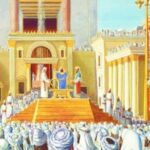Articles in Vayelech
End of the Hakhel

We are at the end of a hakhel year. The seventh year of the cycle is shemitah—the sabbatical, when the land is left fallow, and everything that grows belongs to everyone equally. The following year is hakhel; all farms, vineyards, olive groves, etc., are back in business.
Hakhel means to gather. …
Shabbat Shuvah: The Loving Exam

The days of reckoning are here, and it is time for the loving exam. Most exams are associated with tension and trepidation. Irrespective of how well we know the material, proctors do their best to make it stressful. Fear of failure, fear of getting caught cheating, and fear of falling …
Shabbat Shuvah: Jewish Guilt

Have you ever heard of Jewish guilt? Well, of course. If you have a Jewish mother, you know about Jewish guilt. But the truth is that Jews have little to do with guilt. In fact, the Catholics claim to have cornered the market on guilt. Considering the Catholic doctrine of …
Vayelech: All For The Boss

Three Messages
I always say that it’s better to work for G-d, than for man. Man pays a higher salary than G-d, and every Rabbi can attest to that, but when you need the money and G-d is your boss, G-d always comes through.
Tweet
Nitzavim Vayelech: The Key is Education

Returning The Keys
When the marauding Babylonian army broke into the Temple they found priests going about their sacred duties in ecclesiastic devotion. Some prepared meal offerings, others stoked the altar’s flames, yet others inspected logs to ensure their perfection. Outside the battle raged, but inside, the worship continued without distraction.
Tweet
Vayelech: Students or Contributors?

End Of An Era
The Torah is G-d’s book, given in complete form to Moses, subject to neither addition nor subtraction. Yet many questions were left unaddressed in the written Torah and later sages resolved them through independent analysis. This leaves us with a question, are we recipients of the Torah …
Vayelech: Food for Thought for your Dinner Table

Sunday: Where Did He Go?
The first words of our parshah, “And Moshe went and spoke to the sons of Israel.” Where did he go? Taking into account that this parshah is read between Rosh Hashanah and Yom Kippur the commentaries suggest that he went to inspire Jews to repent. No …
Nitzavim Vayelech: Genuine Growth

To Tell or Not To Tell
On the first day of school, hoping to impress the class with his experience, my brother’s teacher listed the many schools where he had taught over the previous decade. One boy , dully impressed, but not quite in the way the teacher had hoped, wondered, …






















